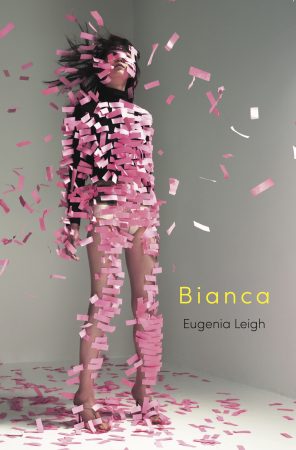
paper • 124 pages • 17.95
ISBN: 978-1-954245-44-0
eISBN: 978-1-954245-45-7
March 2023 • Poetry
Reviewed by The Rumpus
“I thought I forgave you,” Eugenia Leigh tells the specter of her father in Bianca. “Then I took root and became / someone’s mother.” Leigh’s gripping second collection introduces us to a woman managing marriage, motherhood, and mental illness as her childhood abuse resurfaces in the light of “this honeyed life.” Leigh strives to reconcile the disconnect between her past and her present as she confronts the inherited violence mired in the body’s history. As she “choose[s] to be tender to [her] child—a choice / [her] mangled brain makes each day,” memories arise, asking the mother in her to tend, also, to the girl she once was. Thus, we meet her manic alter ego, whose history becomes the gospel of Bianca: “We all called her Bianca. My fever, my havoc, my tilt.” These poems recover and reconsider Leigh’s girlhood and young adulthood with the added context of PTSD and Bipolar Disorder. They document the labyrinth of a woman breaking free from the cycle of abuse, moving from anger to grief, from self-doubt to self-acceptance. Bianca is ultimately the testimony of one woman’s daily recommitment to this life. To living. “I expected to die much younger than I am now,” Leigh writes, in awe of the strangeness of now, of “every quiet and colossal joy.”
The rest of us,
trembling among our mothers’
bargain trench coats, waited
for Narnia. There, we dreamed
we were the children
of lions. Heirs to our own beds. Safe
in a closet rapturous with centaurs
in symphony with naiads and fauns. And I,
pink and young, swelled like a sinless sun. And I
pretended my father—
who had struck me then shoved me in—
would find my tomb empty
and repent. No, that is the adult talking.
I was a child then. It didn’t matter
what he’d done.
I still wanted to be found.
Bianca is stunning, powerful, a lesson in memory’s resistance to healing. Fiercely honest and a master of line breaks, Eugenia Leigh writes about trauma and mental illness in a way that reminds me that terror can still accompany thriving. Traversing childhood, young adulthood, marriage and new motherhood, Leigh contends with the ways constant survival can keep a person from living and loving. I am more alive and more myself after reading these poems. This is a book I didn’t know I was waiting for.
Eugenia Leigh’s Bianca pierces with its white hot rage and sorrow. With terrifying honesty and lyric precision, Leigh revisits the cyclonic violence her father inflicted upon her and her family and explores the dangers of mental illness when it goes unspoken, untreated, and unnamed. Bianca devastates me.
I hope you read Eugenia Leigh’s Bianca from cover to cover, in one sitting, as I have. In these pages you will travel with a woman — brain, heart, and gut — delving into nightmare and violence to finally retrieve a life of love and motherhood, to accept that life. These poems, which are sometimes a torrent, sometimes a clear evening sky, challenge the reader to witness pain and then reward us with the poet’s relentless search for connection and beauty.